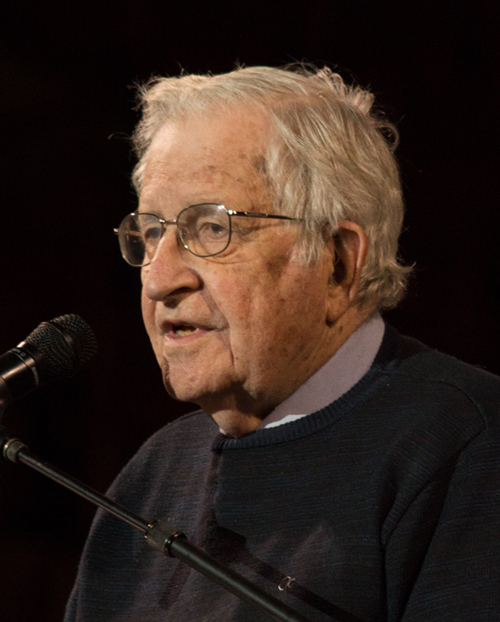
Your complimentary articles
You’ve read one of your four complimentary articles for this month.
You can read four articles free per month. To have complete access to the thousands of philosophy articles on this site, please
Philosophical Haiku
Noam Chomsky (1928-)
by Terence Green
A finite wellspring
Native to the human mind:
Boundless potential.

Noam Chomsky © Σ 2017 Creative Commons 4
For his relentless attacks on American foreign policy and his championing of the world’s oppressed peoples, Noam Chomsky has been a hero for many would-be revolutionaries. Less well known, perhaps, is his pioneering work in linguistics, where Chomsky was responsible for his own revolution.
Chomsky’s interest in politics began early. At the age of ten he wrote his first article on the dangers of fascism, and by the age of twelve or so he was identifying himself as an anarchist (his parents were thrilled). As an undergraduate he became fascinated by linguistics, which he studied while maintaining his involvement in leftist politics. This set the pattern for his life – changing the way we think about language while trying to change the world. It’s a lot for one man to do, but he seems to enjoy it.
Chomsky thought of linguistics as a subdiscipline of cognitive psychology, owing to its concern with the linguistic structures which inhabit a person’s brain, and so their mind. These structures for grammar comprehension are part of the neurological endowment we’ve inherited through the evolutionary process. We are all born, said Chomsky, in possession of a ‘universal grammar’, a basic toolbox of interpretation we apply to whatever language is present in our environment (had I been born elsewhere, I may have written this in Hiligaynon or Gheg, and you would’ve needed a dictionary). This is why young children can string together complex, grammatically valid sentences without having any understanding of the grammatical rules they’re using (most adults haven’t got a clue about that either, for that matter). It’s a truly awesome system ¬ even if doubts about its exact nature, or even existence, remain.
Using a finite set of rules, then, a speaker can generate a potentially infinite variety of linguistic expressions. So language is all about following the rules. And to think it took an anarchist to make that clear!
© Terence Green 2024
Terence Green is a writer, historian, and lecturer who lives in Eastbourne, New Zealand.









